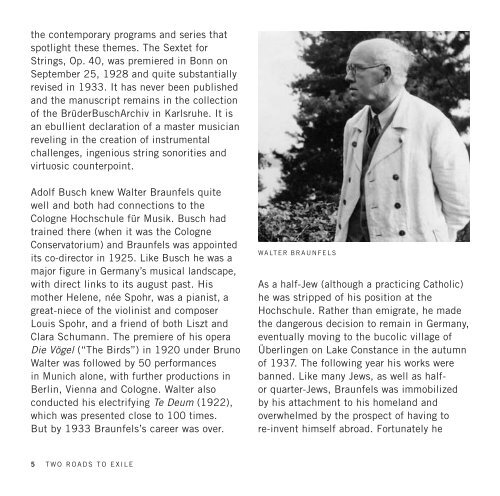ARC_CDbooklet_FA.qxd:Layout 1 - ARC Ensemble
ARC_CDbooklet_FA.qxd:Layout 1 - ARC Ensemble
ARC_CDbooklet_FA.qxd:Layout 1 - ARC Ensemble
Sie wollen auch ein ePaper? Erhöhen Sie die Reichweite Ihrer Titel.
YUMPU macht aus Druck-PDFs automatisch weboptimierte ePaper, die Google liebt.
the contemporary programs and series that<br />
spotlight these themes. The Sextet for<br />
Strings, Op. 40, was premiered in Bonn on<br />
September 25, 1928 and quite substantially<br />
revised in 1933. It has never been published<br />
and the manuscript remains in the collection<br />
of the BrüderBuschArchiv in Karlsruhe. It is<br />
an ebullient declaration of a master musician<br />
reveling in the creation of instrumental<br />
challenges, ingenious string sonorities and<br />
virtuosic counterpoint.<br />
Adolf Busch knew Walter Braunfels quite<br />
well and both had connections to the<br />
Cologne Hochschule für Musik. Busch had<br />
trained there (when it was the Cologne<br />
Conservatorium) and Braunfels was appointed<br />
its co-director in 1925. Like Busch he was a<br />
major figure in Germany’s musical landscape,<br />
with direct links to its august past. His<br />
mother Helene, née Spohr, was a pianist, a<br />
great-niece of the violinist and composer<br />
Louis Spohr, and a friend of both Liszt and<br />
Clara Schumann. The premiere of his opera<br />
Die Vögel (“The Birds”) in 1920 under Bruno<br />
Walter was followed by 50 performances<br />
in Munich alone, with further productions in<br />
Berlin, Vienna and Cologne. Walter also<br />
conducted his electrifying Te Deum (1922),<br />
which was presented close to 100 times.<br />
But by 1933 Braunfels’s career was over.<br />
WALTER BRAUNFELS<br />
As a half-Jew (although a practicing Catholic)<br />
he was stripped of his position at the<br />
Hochschule. Rather than emigrate, he made<br />
the dangerous decision to remain in Germany,<br />
eventually moving to the bucolic village of<br />
Überlingen on Lake Constance in the autumn<br />
of 1937. The following year his works were<br />
banned. Like many Jews, as well as halfor<br />
quarter-Jews, Braunfels was immobilized<br />
by his attachment to his homeland and<br />
overwhelmed by the prospect of having to<br />
re-invent himself abroad. Fortunately he<br />
5 TWO ROADS TO EXILE




